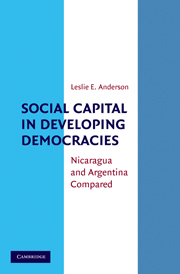8 - Conclusion
Published online by Cambridge University Press: 05 June 2012
Summary
Too many people expect wonders from democracy, when the most wonderful thing of all is just having it.
Walter WinchellYou may be deceived if you trust too much, but you will live in torment if you don't trust enough.
Frank CraneThis book offers many lessons about the relationship between “the people” and democracy. The book grew out of a theory, dating back to Tocqueville that posits a positive relationship between the people and democracy: democracy will be better, grow stronger, be healthier, if the people participate in their polity to a fuller rather than to a lesser extent. Contemporary perspectives on social capital pick up this positive view of popular involvement, suggesting that “the people,” vis-à-vis their organizations, can make democracy work and keep it alive. Without them, democracy is in trouble.
Considering the origins of the word “democracy,” this is hardly a surprising conclusion. Indeed, we would be alarmed if conclusions ran otherwise. And yet, the comparison of Nicaragua and Argentina shows that popular involvement in politics is very complex, and that it cannot be qualified with a simple term, such as “positive.” The relationship between citizen politics, mass movements, social movements, and democracy may very well be positive, but, then again, it may not. Scrutiny of the nature of different popular movements and the values they inspire leaves us knowing more about the relationship between citizen politics and democracy, and this same scrutiny has led us to reflect more deeply upon the relationship between social trust and democratic politics.
- Type
- Chapter
- Information
- Social Capital in Developing DemocraciesNicaragua and Argentina Compared, pp. 238 - 272Publisher: Cambridge University PressPrint publication year: 2010

